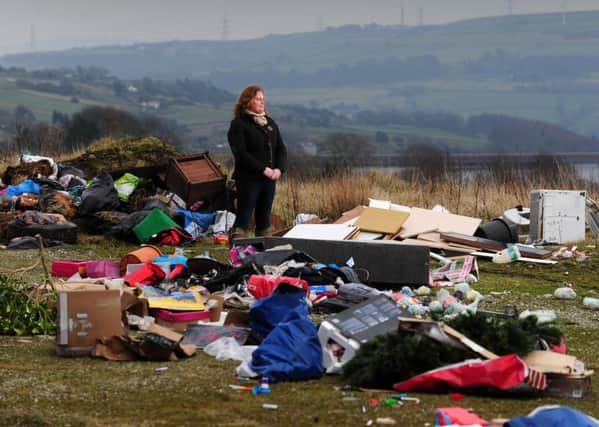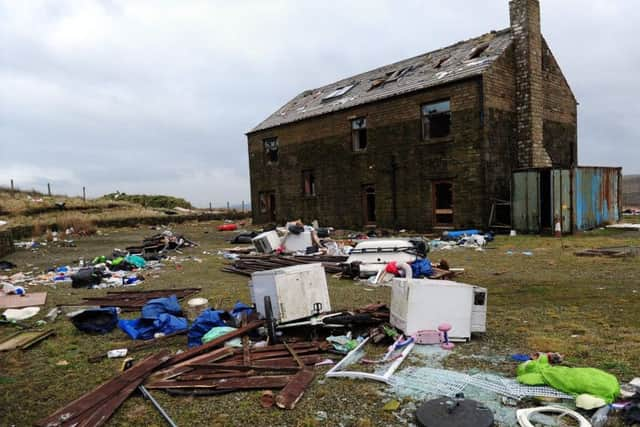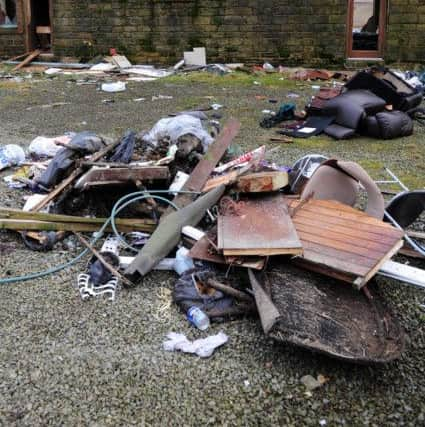Legal rules leave Ripponden farmer unsure how to tackle mass of dumped waste


As part of a new 25-year Environment Plan announced by Prime Minister Theresa May yesterday, the government vowed to eradicate waste crime over the life of the plan, but the commitment is little comfort for Ripponden farmer Rachel Hallos.
Mrs Hallos, who is a tenant farmer on land owned by Yorkshire Water, faces spending thousands of pounds to remove heaps of waste ranging from nappies, fridges, food and glass to building materials, Christmas decorations, discarded children’s toys and mattresses, after a small plot of private land belonging to an absentee landowner in the centre of Beeston Hall Farm was targeted over Christmas.
Advertisement
Hide AdAdvertisement
Hide AdThe debris is scattered around a renovated barn that has been vandalised and the waste is being blown onto her land.


Councils are responsible for removing waste dumped on public land but private landowners are left to pay the clean up costs when their own land is affected.
Mrs Hallos said she had no way of contacting the landowner, that she would technically be trespassing if she entered the plot to clear up and she had no right to restrict access to a privately owned track connecting the site with a nearby road.
She has contacted her landowner Yorkshire Water, Calderdale Council and her local MP to understand how the waste can tackled but both the water company and the council say they have no right to access the site.
Advertisement
Hide AdAdvertisement
Hide Ad

Mrs Hallos said: “I’m not sure what to do about it. Who is going to clear it up and pay the bill? We are not talking about a skip full here.
“We can clear it up when it comes onto our land all day long but if we can’t block access to the site they are going to come back.”
A Yorkshire Water spokesperson said the company sympathised with her predicament but added: “As this is on private land it is outside of our jurisdiction to take any action. If it was on our land we would clean it up straight away as this is a blight on the countryside and whoever did it clearly has no respect for the environment.”
Mrs Hallos wants to raise awareness of a growing problem, saying: “This is a story that is reoccurring time and time again across the country. What can be done about it? It’s a huge-scale problem.”


Advertisement
Hide AdAdvertisement
Hide AdAdam Bedford, regional director of the NFU, said the scale and nature of the waste dumped in Ripponden was concerning, and he called on the local authority and local Environment Agency team to investigate.
He said fly-tipping affects two out of three farmers and clean-up operation can be very costly and time consuming, while waste can pose a threat to human health, wildlife and farm livestock, and even pollute watercourses and contaminate land.
“With local authorities dealing with more than a million incidents in England in 2016/7; a rise of seven per cent on the previous year, the NFU has been calling for urgent action,” Mr Bedford said.


“We want all parties – local authorities, the Environment Agency, landowners and ultimately the police - to work together to tackle what is an increasing blight on the countryside.”
Advertisement
Hide AdAdvertisement
Hide Ad“The government pledge to seek to eliminate waste crime over the lifetime of the 25-year environment plan is very much welcomed and we hope to work closely with Defra to develop a new approach. It is encouraging to see renewed resolve to deliver tangible results and this is something the NFU will seek to keep Ministers focused on.”
MOUNTING WASTE CRIME
The Environmental Services Association estimated that waste crime cost the UK economy between £568m and £808m in 2013; in 2015, it cost the English economy at least £604m.
In its 25-year Environment Plan announced yesterday, the Government said it would seek to eliminate waste crime and illegal waste sites over the plan’s lifetime, explore the introduction of electronically tracking waste, develop a new strategic approach to prevent, detect and deter waste crime and adopt a partnership approach to deal with the issue with industry, regulators and local authorities.